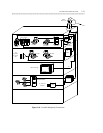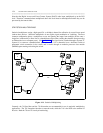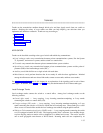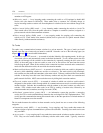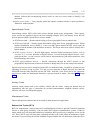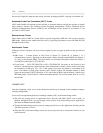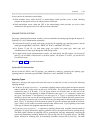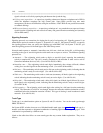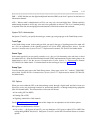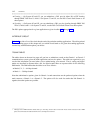TRUNKING 1-41
_ ______________________________________________________________________________________
_ ______________________________________________________________________________________
_ ______________________________________________________________________________________
DMI — A DS1 link that uses the digital multiplexed interface (DMI) as the level 2 protocol on the bearer or
information channels.
AVD — When a trunk is administered as AVD, it can carry only voice and digital data. Without explicitly
administering the trunk as AVD, only voice and voice-grade data are allowed. This is so if modem pooling
is required in the link, the analog/digital transformations will be both accurate and consistent.
System 75/G1 Administration
On System 75 and G1, you specify the trunk type, comm type, and group type at the Trunk Group screen.
Trunk Type
At the Trunk Group screen, in the trunk type field, you specify the type of signaling protocol the trunk will
use. (For an explanation of the signaling protocol see System 85/G2 Administration, above.) See the
DEFINITY Communications System, Generic 1.1 Implementation manual, 555-204-654, for further details.
Comm Type
In the comm type field, you can specify a trunk as voice, data, avd (for alternating voice and data), or rbavd
(for robbed bit avd). Some Software-Defined Network (SDN) implementations require trunks groups to be
administered as rbavd. See the DEFINITY Communications System, Generic 1.1 Implementation manual,
555-204-654, for further details. For further details on the comm type rbavd, see appendix G.
Group Type
You also enter the group type at the Trunk Group screen. Group types can be "tie," "tandem," "ISDN PRI,"
and so forth. See the DEFINITY Communications System, Generic 1.1 Implementation manual, 555-204-654,
for further details.
DS1 Options
When you access either the LEC or the interexchange carrier through a digital trunk, the kind of route you
choose for access may be through restricted or unrestricted channels, or through multiplexing equipment
(like a D4 channel bank). The characteristics of the route will dictate:
• Line coding (ZCS or B8ZS)
• Framing (D4 or ESF)
• Signaling (robbed-bit or 24th-channel)
See the Multiplexed Communication section of this chapter for an explanation of each of these options.
DS1 options are administered as follows:
• Line coding — On System 85 and G2, you can administer a DS1 port for either ZCS or B8ZS line
coding through PROC 260, field 9. On System 75 and G1, use the DS1 Circuit Pack Screen to set these
options.



